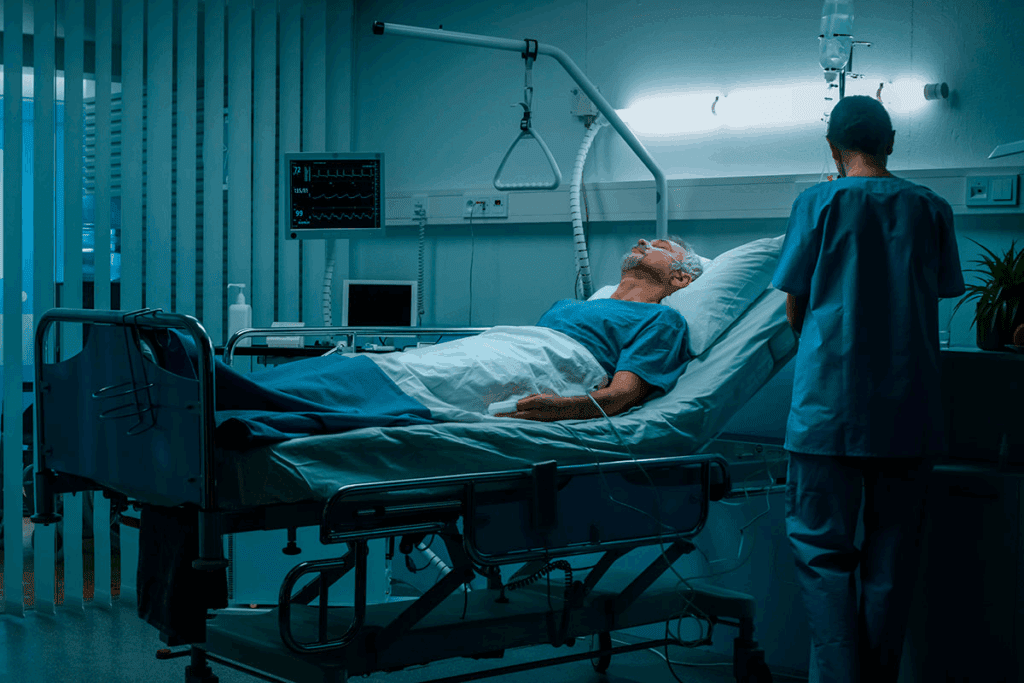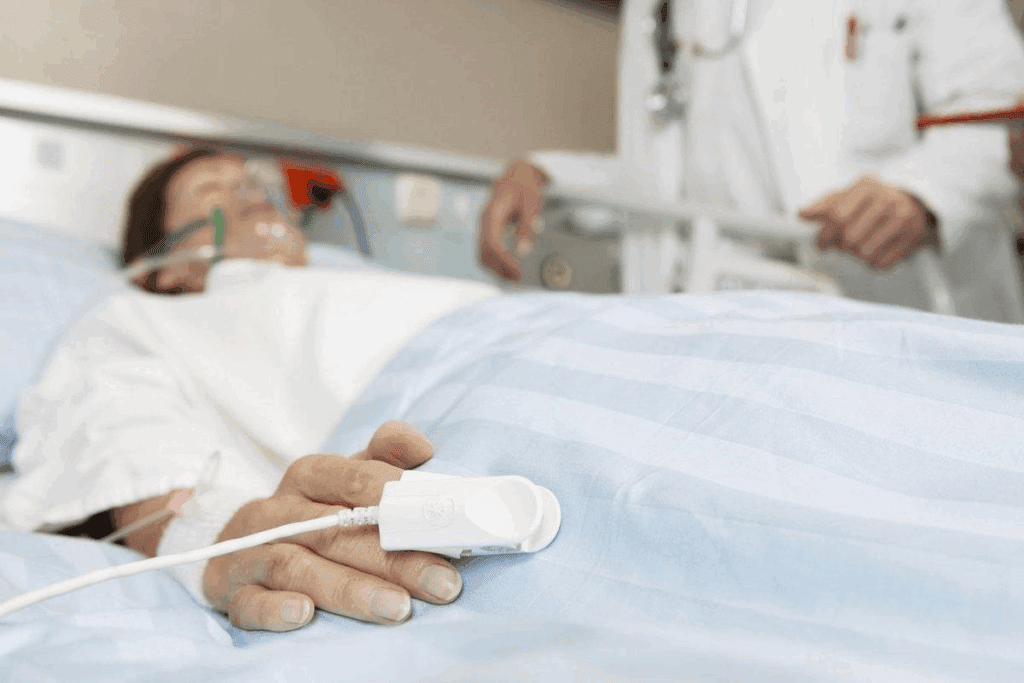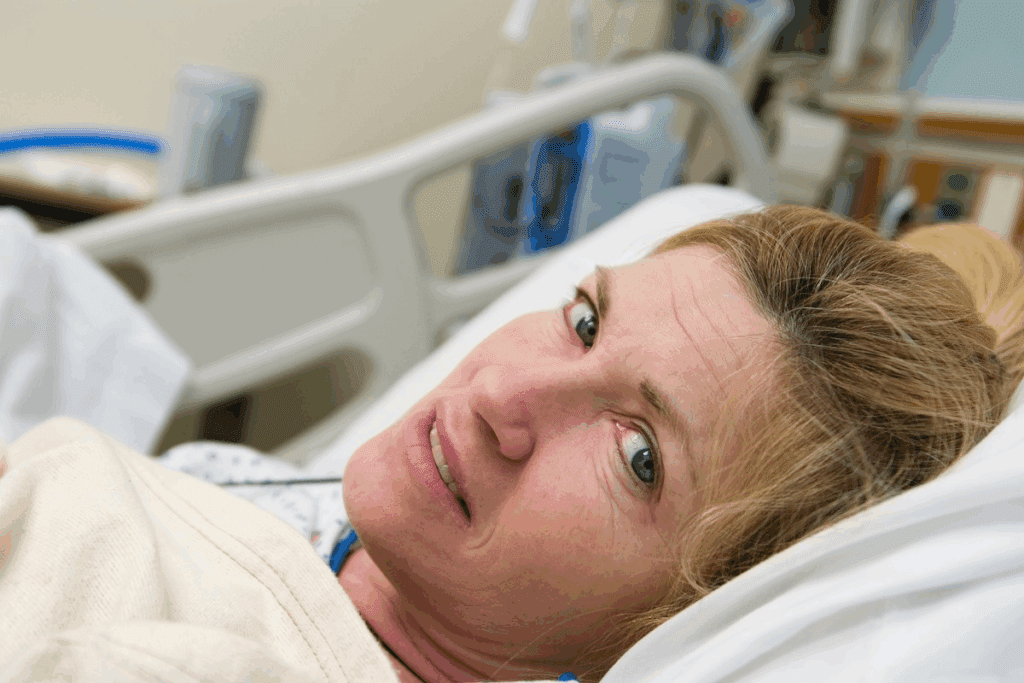
At Liv Hospital, we know that cortisone shots help with pain but can also cause anxiety and other side effects. We are a trusted leader in patient care, focusing on your needs. We want you to understand these reactions if you’re thinking about this treatment.
Cortisone shots are used to treat pain and inflammation. But, many patients wonder, can a cortisone shot cause anxiety? The answer is yes — for some people, corticosteroids can temporarily affect mood, leading to feelings of restlessness or anxiety. We aim to give you top-notch healthcare and support, helping you every step of the way.
Key Takeaways
- Cortisone shots can have significant side effects, including anxiety and mood changes.
- Liv Hospital is committed to providing internationally competitive medical outcomes.
- Understanding the possible side effects is key for those considering cortisone shots.
- Our team offers a full range of support to help you through your treatment.
- We guide you on dealing with the effects of cortisone shots.
Understanding Cortisone Shots and Their Medical Applications

Cortisone shots are injections that help with pain and swelling in the body. They contain corticosteroids, not to be confused with anabolic steroids. These shots are a common treatment for many inflammatory conditions. Knowing how they work and what they treat can help patients make better choices about their care.
What Are Cortisone Shots and How Do They Work?
Cortisone shots are given directly to the affected area. They provide targeted relief from pain and swelling. The corticosteroids in these shots reduce inflammation by suppressing the immune system’s response.
Mechanism of Action: Corticosteroids act like cortisol, a hormone our bodies make naturally. They help reduce inflammation and calm the immune system.
Common Medical Conditions Treated with Cortisone
Cortisone shots are used for many medical conditions, like arthritis, tendinitis, and bursitis. These conditions cause inflammation, leading to pain and discomfort.
| Condition | Description | Benefit of Cortisone Shot |
| Arthritis | Inflammation of the joints | Reduces joint pain and inflammation |
| Tendinitis | Inflammation of the tendons | Relieves tendon pain and inflammation |
| Bursitis | Inflammation of the bursae | Reduces bursae inflammation and pain |
Different Types of Cortisone Injections
There are many types of cortisone injections, each for different uses and benefits. The right injection depends on the condition and the patient’s health.
Types of Cortisone Injections:
- Triamcinolone
- Methylprednisolone
- Betamethasone
Can a Cortisone Shot Cause Anxiety? Exploring the Connection

Cortisone shots have been linked to anxiety in some patients. This raises questions about their impact on the central nervous system. Cortisone injections are used to treat many medical conditions, but their link to anxiety is a concern for many.
How Steroids Affect the Central Nervous System
Steroids, like cortisone, can significantly affect the central nervous system (CNS). When given, cortisone can change the body’s natural hormonal balance. This can lead to mood and anxiety changes.
The CNS, which includes the brain and spinal cord, is sensitive to steroids. Steroids can influence neurotransmitter activity and hormone regulation.
The impact of steroids on the CNS can be significant. Research shows that steroids can change the brain’s chemistry, causing anxiety. The exact ways this happens are complex and involve steroids interacting with neurotransmitter systems.
Physiological Mechanisms Behind Anxiety Symptoms
Anxiety symptoms after cortisone injections can be due to several reasons. One key reason is how steroids affect the HPA axis. This axis regulates the body’s stress response. Steroids can disrupt this, leading to increased anxiety.
| Mechanism | Description | Effect on Anxiety |
| HPA Axis Disruption | Steroids affect the hypothalamic-pituitary-adrenal axis, altering stress response. | Increased anxiety due to dysregulated stress response. |
| Neurotransmitter Modulation | Steroids influence neurotransmitter activity, such as serotonin and dopamine. | Altered mood regulation, potentially leading to anxiety. |
| Hormonal Changes | Cortisone alters the body’s natural hormonal balance. | Mood swings and increased anxiety. |
Research on Cortisone-Induced Anxiety
Studies have looked into the connection between cortisone shots and anxiety. They provide insights into how common and why cortisone-induced anxiety happens. While not everyone gets anxious, it’s a known side effect.
Understanding the link between cortisone shots and anxiety is key for patient care. Recognizing anxiety as a possible side effect helps healthcare providers support patients better.
Psychological Side Effects of Cortisone Injections
Cortisone injections help reduce inflammation but can also affect your mind. These effects are part of how corticosteroids work in the body.
Mood Swings and Emotional Instability
Mood swings are a common side effect of cortisone shots. People might feel very happy or very upset. This emotional instability can be hard for patients and their families.
The reasons behind these mood swings are complex. They involve how corticosteroids affect the brain’s chemicals. Monitoring mood changes and telling doctors is key to handling these effects.
Panic Attacks and Heightened Stress Responses
Some people might have panic attacks or feel more stressed after a cortisone shot. These reactions can be very upsetting and might need special help.
Knowing these reactions come from the shot can help patients deal with them. Relaxation techniques and sometimes more medicine can help manage these symptoms.
Confusion and Cognitive Impairments
Cortisone shots can also cause confusion and problems with thinking in some. These might show up as trouble focusing or memory problems.
Even though these effects are usually short-lived, they can be worrying. Patients should keep a record of their symptoms and talk to their doctor about any worries.
By knowing about the possible mental side effects of cortisone shots, patients can prepare for treatment. They can also ask for help when they need it.
Sleep and Energy-Related Side Effects
After getting a cortisone injection, some people might find it hard to sleep and feel tired. It’s important to understand and handle these issues. Cortisone shots are used to fight inflammation, but they can mess with sleep and energy.
Insomnia and Sleep Disturbances
Insomnia and sleep problems are common after cortisone shots. The steroid can mess with your body’s natural rhythm, making it hard to fall or stay asleep. These sleep issues are usually short-term but can really affect your day.
To deal with insomnia after a cortisone shot, stick to a regular sleep schedule. Avoid caffeine and screens before bed. Also, try a calming bedtime routine. If sleep problems last, talk to a doctor for help.
Fatigue and Energy Level Fluctuations
Fatigue is another common side effect of cortisone injections. The steroid can make you feel really tired or sluggish. It’s key to know the difference between normal tiredness and serious symptoms that need a doctor.
As your body gets used to the cortisone, your energy might go up and down. Doing light exercises, eating well, and drinking enough water can help. If you’re really tired or it lasts a long time, see your doctor.
Does a Steroid Shot Make You Sleepy?
Whether a steroid shot makes you sleepy is different for everyone. Some might feel sleepier, while others might have trouble sleeping.
How cortisone affects sleep and energy depends on many things. This includes the dose, the condition being treated, and how your body reacts to steroids. Watching how your body reacts and talking to your doctor can help manage these side effects.
| Side Effect | Possible Causes | Management Strategies |
| Insomnia | Disruption of cortisol rhythm | Maintain a consistent sleep schedule, avoid pre-bedtime caffeine |
| Fatigue | Body’s response to steroid | Gentle exercises, balanced diet, adequate hydration |
| Sleepiness | Individual response to cortisone | Monitor body reaction, consult a healthcare provider |
Digestive and Physical Discomfort After Injections
Cortisone shots are a common treatment for many conditions. But, they can make some people feel sick. We’ll look at the side effects like digestive issues and physical discomfort. We’ll also give tips on how to manage them.
Nausea and Feeling Sick After Cortisone Injection
Nausea is a common side effect after cortisone shots. It can be mild or severe. The exact reason for nausea is not known, but it’s thought to be a body reaction to the steroid.
Some people feel nauseated right after the shot. Others might not feel it until hours later. To help with nausea, eating small meals and avoiding heavy foods is advised. Sometimes, doctors will prescribe anti-nausea medication.
Tips to manage nausea:
- Eat small, frequent meals
- Avoid heavy or greasy foods
- Stay hydrated
- Consider anti-nausea medication if prescribed
Appetite Changes and Weight Fluctuations
Cortisone shots can change your appetite and weight. Some people might eat more and gain weight. Others might eat less and lose weight.
Managing these changes can be tough. But, eating a balanced diet and keeping track of your food can help. It’s also important to talk to your doctor about any big changes in your appetite or weight.
“Maintaining a healthy lifestyle, including a balanced diet and regular exercise, can help manage weight fluctuations after cortisone injections.”
Managing Post-Injection Physical Discomfort
Dealing with physical discomfort after cortisone shots requires self-care and sometimes medical help. It’s best to rest and avoid hard activities right after the shot.
Putting ice on the injection site can help with pain and swelling. Doctors might also suggest over-the-counter pain relievers. Always follow their advice on how to care for yourself after the shot.
- Rest and avoid strenuous activities
- Apply ice to the injection site
- Use over-the-counter pain relievers as directed
- Follow healthcare provider’s instructions
Localized Reactions at Injection Sites
Localized reactions at the site of cortisone injections are common. These reactions can vary in severity and impact the recovery process.
Pain After Cortisone Shot in Foot and Other Locations
Pain at the injection site is a frequent complaint after cortisone shots. This discomfort can come from the injection process or the body’s reaction to the cortisone. In the foot, pain can be more bothersome because of the weight-bearing area.
Managing pain effectively is key for a smooth recovery. We suggest following the doctor’s advice on pain management. This may include rest, ice application, or over-the-counter pain relievers.
Swelling and Inflammation Responses
Swelling and inflammation are common after cortisone injections. Even though cortisone reduces inflammation, the injection can cause swelling at first. This reaction is usually temporary and goes away within a few days.
To reduce swelling, applying ice to the affected area can help. Elevating the injected limb, if applicable, can also reduce swelling.
Cortisone Foot Injection Side Effects
Cortisone foot injections are beneficial for conditions like plantar fasciitis but have side effects. Patients may experience pain, swelling, changes in skin pigmentation, or thinning of the skin around the injection site.
It’s important to discuss possible side effects with your healthcare provider. This way, you’ll know what to expect and how to manage any adverse reactions.
Systemic Side Effects of Cortisone Shots
Cortisone injections can cause side effects that affect the whole body. These effects can be serious and impact a patient’s health in many ways.
Blood Sugar Spikes in Diabetic and Non-Diabetic Patients
Cortisone shots can raise blood sugar levels in both diabetic and non-diabetic patients. This happens because corticosteroids release glucose into the blood from stored energy.
Diabetic patients may struggle to control their blood sugar, leading to high levels. Non-diabetic patients might also see their blood sugar go up, but this usually doesn’t last long.
| Patient Group | Effect on Blood Sugar | Management Strategy |
| Diabetic Patients | Hyperglycemia | Monitor blood sugar closely, adjust medication as needed |
| Non-Diabetic Patients | Temporary elevation | Monitoring recommended, if symptoms last |
Excessive Sweating After Steroid Injection
Some people sweat a lot after getting a cortisone shot. This is often because their body is reacting to the steroid.
This sweating can be uncomfortable and might come with other symptoms like flushing or a fast heart rate. Luckily, this side effect usually goes away on its own.
Impact on Immune System Function
Cortisone shots can weaken the immune system. This makes patients more likely to get sick. This is a big concern for people whose immune systems are already weak.
It’s important for patients to know about this risk. They should stay clean and avoid germs to protect themselves.
Cardiovascular Effects of Cortisone
Corticosteroids can affect the heart and blood vessels. They can change blood pressure and cause fluid buildup. These effects are more common with long-term use or high doses.
People with heart problems should be watched closely by their doctors before getting cortisone shots.
Allergic Reactions to Cortisone Injections
Allergic reactions to cortisone injections can range from mild to severe. These reactions are something both patients and healthcare providers need to consider. Cortisone shots are usually safe and effective for reducing inflammation. But, there’s a chance for an allergic response.
Identifying Steroid Shot Rashes and Skin Reactions
Skin reactions are common signs of an allergic response to cortisone injections. These can include redness, itching, and swelling at the injection site. Sometimes, a steroid shot rash may appear, looking like a red, raised area that’s itchy or painful.
We suggest keeping an eye on the injection site for any signs of a reaction. If you notice unusual symptoms like increased redness, swelling, or itching, contact your healthcare provider right away.
Severe Allergic Responses Requiring Medical Attention
Severe allergic reactions to cortisone injections are rare but can be life-threatening. Symptoms include difficulty breathing, rapid heartbeat, dizziness, or a drop in blood pressure. If you or someone you know is showing these signs, get emergency medical help right away.
Differentiating Between Normal Side Effects and Allergic Reactions
It can be tricky to tell normal side effects from an allergic reaction. Common side effects like temporary pain or swelling at the injection site are usually mild and go away on their own. But, if you notice unusual or persistent symptoms, it’s important to talk to your healthcare provider.
We recommend keeping a record of any symptoms after a cortisone injection. Note when they started and how long they last. This info can help your healthcare provider figure out if it’s an allergic reaction or a normal side effect.
In conclusion, while allergic reactions to cortisone injections are rare, knowing the signs and symptoms is key. If you have concerns about an allergic reaction or any part of your treatment, don’t hesitate to contact your healthcare provider.
Managing Cortisone Reactions and Side Effects
Cortisone injections are effective but can cause reactions and side effects. Healthcare providers work hard to manage these to keep patients comfortable and safe.
Immediate vs. Delayed Cortisone Reactions
Reactions to cortisone injections can happen right away or later. Immediate reactions show up within hours, like pain, swelling, or an allergic reaction. Delayed reactions can take days or weeks, causing mood changes, sleep issues, or energy shifts.
Knowing when a reaction happens is key. This helps doctors give the right treatment to each patient.
Treatment Options for Various Side Effects
Treating side effects from cortisone shots depends on the reaction. For mild issues, rest, ice, and over-the-counter pain meds might help. But, severe reactions might need stronger treatments, like antihistamines or more corticosteroids.
- Topical treatments can help with local reactions.
- Systemic side effects might need medication changes or extra treatments.
- Teaching patients about side effects is also important.
Follow-up Care After Experiencing Side Effects
After side effects, follow-up care is vital. Patients need to be watched to make sure the side effects go away and the shot works as planned.
At follow-ups, doctors can check how the patient is doing. They can change treatment plans if needed and offer support and advice.
Medical Protocols for Managing Adverse Reactions
Having clear protocols for cortisone shot side effects is critical for patient safety. These should cover how to spot and handle both quick and slow reactions. They should also outline how to give treatments to lessen side effects.
With these protocols, doctors can manage side effects better. This improves patient care and results.
Conclusion: Balancing Benefits and Risks of Cortisone Treatments
Cortisone shots are a helpful treatment for many health issues. But, they can cause side effects like anxiety and mood swings. At Liv Hospital, we aim to find the right balance for our patients.
Knowing about these side effects helps patients make better choices. Our team works together to give each patient the best care. This way, we reduce risks and increase the good effects of cortisone shots.
By carefully considering the pros and cons, we offer top-notch healthcare. Our dedication to quality care helps our patients get the best results. We support them every step of the way.
FAQ
Can cortisone shots cause anxiety and other psychological side effects?
Yes, cortisone shots can lead to anxiety and mood swings. This is because they affect the central nervous system.
What are the common side effects of cortisone injections?
Common side effects include pain and swelling at the injection site. You might also experience insomnia, mood changes, and in rare cases, allergic reactions.
Does a steroid shot make you sleepy?
Some people might feel tired after a steroid shot. But it doesn’t usually make you sleepy. It can, though, disrupt your sleep.
Can cortisone injections cause nausea?
Yes, some people might feel nauseous or sick after a cortisone injection. But it’s not a common experience for everyone.
How can I manage pain after a cortisone shot in my foot?
To manage pain, rest and apply ice to the area. You can also take over-the-counter pain relievers, as advised by your doctor.
Are there any long-term side effects of cortisone shots?
Long-term side effects can include impacts on bone density and immune system suppression. There’s also a risk of cardiovascular effects.
Can cortisone shots cause allergic reactions?
Yes, though rare, allergic reactions to cortisone shots can happen. They range from mild skin rashes to severe reactions needing immediate medical help.
How do I differentiate between normal side effects and allergic reactions to cortisone?
Normal side effects are usually mild and short-lived. Allergic reactions are severe and include symptoms like widespread rash, difficulty breathing, or a significant drop in blood pressure.
What should I do if I experience severe side effects after a cortisone injection?
If you have severe side effects, like a significant allergic reaction or severe pain, seek medical help right away.
Can cortisone shots affect blood sugar levels?
Yes, cortisone shots can cause blood sugar spikes in both diabetic and non-diabetic people. This is usually temporary.
Are there any measures to minimize the side effects of cortisone shots?
Yes, to minimize side effects, talk to your healthcare provider about your medical history. Follow their post-injection care instructions and watch how your body reacts.
References
- Karam, G., & Sharifov, O. (2023). Managing adverse effects of corticosteroid injections: best practices. American Journal of Orthopedics, 52(3), 133-139.
https://pubmed.ncbi.nlm.nih.gov/36894712/























